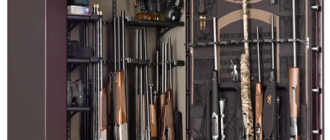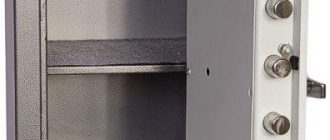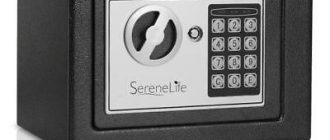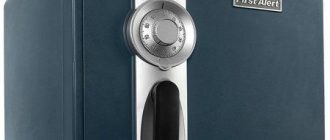
Things you need to know when choosing a wall safe
When it comes to protecting your valuable belongings, a wall safe is a popular and secure choice. Wall safes offer a discreet and hidden storage option that can be easily accessed but difficult for burglars to locate. However, choosing the right wall safe requires careful consideration of several factors.
First, you need to know the dimensions of the wall space where you plan to install the safe. Measure the height, width, and depth of the available area to ensure that the safe will fit properly. Additionally, consider the weight of the safe and ensure that the wall can support it securely.
Another important factor to consider is the level of security the safe provides. Look for safes with strong and durable construction, such as solid steel walls and pry-resistant doors. The safe should also be equipped with a reliable locking mechanism, such as a digital keypad or a biometric fingerprint scanner.
It is also essential to consider the capacity and organization options of the safe. Think about what items you plan to store and choose a safe that offers enough space to accommodate them. Consider the presence of shelves, drawers, or hooks that can help you organize your valuables effectively.
Lastly, consider the installation process and any additional features that may be important to you. Some wall safes require professional installation, while others can be easily DIY-installed. Additionally, you may want to look for safes that offer fire and water resistance, as these can provide additional protection for your valuables.
Choosing the right wall safe is crucial for the security and protection of your valuables. By considering factors such as size, security level, capacity, and installation process, you can ensure that you select a safe that meets your needs and provides peace of mind.
Things to Consider When Choosing a Wall Safe for Your Valuables
When it comes to choosing a wall safe for your valuables, there are several important considerations to keep in mind. These considerations can help ensure that you select a safe that meets your specific needs and provides the necessary level of protection for your belongings.
- Size: Determine the size of the wall safe you need by considering the items you plan to store. Make sure the safe is spacious enough to accommodate your valuables without being too bulky for the designated wall space.
- Mounting: Consider how you want to mount the wall safe. Some safes can be easily installed by anchoring them to the wall studs, while others may require professional installation. Make sure to choose a safe that can be securely and conveniently mounted in your desired location.
- Security Features: Look for safes that offer reliable security features to protect your valuables. Features like a solid steel construction, pry-resistant door, and electronic locking system can help deter unauthorized access and provide peace of mind.
- Fire Resistance: If you plan to store important documents or other items that could be damaged by fire, consider a wall safe with fire resistance capabilities. Look for safes with fire ratings that meet your specific requirements.
- Accessibility: Think about how easily you want to access your valuables. Some safes come with biometric locks or keypad entry systems, while others may have traditional key locks. Choose a safe with an access method that is convenient for you.
- Price: Set a budget for your wall safe purchase and look for options within that price range. Consider the value the safe provides in terms of security and features to ensure you are getting the most value for your money.
- Installation Requirements: Before purchasing a wall safe, make sure to consider any specific installation requirements. This could include drilling into the wall or other structural considerations. Be prepared to meet these requirements or hire professionals if needed.
By considering these important factors, you can make an informed decision when choosing a wall safe for your valuable possessions. Remember to prioritize the security and protection of your belongings to ensure peace of mind.
Finding the Right Size and Capacity
When choosing a wall safe, it is important to consider the size and capacity that you will need. There are a few things to keep in mind when determining the right size for your safe.
1. Assess your storage needs: Consider what items you plan to store in the safe. Are you primarily storing small items like jewelry and cash, or do you need space for larger items like documents or firearms?
2. Measure your available wall space: Before making a purchase, measure the space where you plan to install the safe. You want to ensure that it fits properly and doesn’t stick out or look obtrusive.
3. Consider future needs: Think about any potential need for additional storage in the future. If you anticipate acquiring more valuables, it may be wise to choose a larger safe with room for growth.
4. Don’t forget about depth: Consider the depth of the safe as well. You want to make sure it will fit flush against the wall and not protrude too much.
5. Consult with a professional: If you are unsure about the right size and capacity for your needs, consult with a professional locksmith or safe expert. They can provide guidance and help you make an informed decision.
By considering these factors, you can choose a wall safe that is the right size and capacity to meet your specific needs.
Assessing the Level of Security
When choosing a wall safe for your valuables, it is important to assess the level of security it provides. Here are some things to know and consider:
- Locking Mechanism: Determine the type of locking mechanism the safe has. Common options include key locks, combination locks, and electronic locks. Consider the pros and cons of each and choose the one that best suits your needs.
- Material and Construction: Look for a wall safe made of strong and durable materials, such as steel. Consider the thickness of the safe’s walls and door, as well as the presence of additional reinforcements, like pry-resistant hinges.
- Fire and Water Resistance: If you want to protect your valuables from fire and water damage, choose a wall safe that offers these features. Look for safes with fire ratings and water-resistant seals to ensure maximum protection.
- Mounting Options: Consider how the safe will be mounted to the wall. Look for safes with secure mounting options, such as through-the-wall installation or bolt-down kits, to prevent easy removal by burglars.
- Size and Capacity: Determine the size and capacity of the safe based on your needs. Consider the dimensions of the items you plan to store and ensure that the safe is large enough to accommodate them.
- Certifications and Ratings: Look for wall safes that have been tested and certified by reputable organizations for their security features. Common certifications to look for include UL (Underwriters Laboratories) ratings and RSC (Residential Security Container) certifications.
By considering these factors, you can choose a wall safe that provides a high level of security for your valuable possessions. Remember to thoroughly research and compare different options before making a final decision.
Considering the Type of Lock
When choosing a wall safe, one of the most important things to consider is the type of lock. The lock is what will keep your valuables secure, so it’s crucial to choose a lock that is reliable and effective.
There are several types of locks to choose from when it comes to wall safes. The most common options include key locks, combination locks, and electronic locks. Each type has its pros and cons, so it’s important to know these before making your final decision.
Key locks are traditional and straightforward. They rely on physical keys that need to be kept safe and secure. While key locks can be reliable, they can also be susceptible to key loss or theft. Additionally, it can be inconvenient to carry a key around or remember where it is at all times.
Combination locks, on the other hand, provide a higher level of security. These locks require a specific sequence of numbers or symbols to open. Combination locks are less likely to be compromised, as there are no physical keys involved. However, it’s important to remember the combination and keep it confidential.
Electronic locks are becoming increasingly popular in wall safes. These locks use electronic keypads or biometric sensors, such as fingerprints or retinal scans, to grant access. Electronic locks offer convenience and quick access, but they can be vulnerable to power outages or technical malfunctions.
When choosing the type of lock for your wall safe, consider your personal preferences, security requirements, and ease of use. It’s also a good idea to consult with a security professional for guidance and recommendations based on your specific needs.
Exploring Fire and Water Resistance
When choosing a wall safe to protect your valuables, it is important to consider its fire and water resistance features. These features are crucial in ensuring that your items remain safe and secure in the event of an unforeseen accident or natural disaster.
Fire resistance is a primary consideration when selecting a wall safe. You need to know the safe’s fire rating, which indicates the amount of time it can withstand exposure to fire before the contents inside start to get damaged. Look for a wall safe with a high fire rating, preferably one that can withstand at least an hour of fire exposure.
Water resistance is another key factor to consider. In case of a flood or water leakage, you want your wall safe to be able to protect your valuables. Look for a safe that has a seal or gasket to prevent water from seeping in. An added feature to consider is if the safe has been tested against water damage or if it meets specific water resistance standards.
When choosing a wall safe with fire and water resistance, it is essential to remember that these features may significantly increase the cost of the safe. However, it is worth investing in a safe that can protect your valuable items, important documents, and sentimental belongings from potential harm. The peace of mind that comes with knowing your valuables are secure is invaluable.
Understanding Installation Requirements
When choosing a wall safe to protect your valuables, there are several important considerations you need to know about installation requirements. These factors will ensure that you choose the right safe for your needs and that it is properly installed.
The first thing you need to know is how to select the right wall safe. Consider the size and dimensions of the wall where you plan to install the safe. Measure the area carefully to ensure that the safe will fit properly. Additionally, check the weight capacity of the wall to ensure that it can support the safe.
Another important consideration is the location of the safe within your home. Choose a location that is both secure and easily accessible for you. Consider factors such as visibility and convenience when choosing the location for your wall safe.
Furthermore, it is crucial to understand any building codes or regulations that may apply to the installation of wall safes in your area. Some jurisdictions may have specific requirements regarding the installation of safes, especially if they are being installed in a commercial or public building. Be sure to research and comply with all applicable rules and regulations.
Lastly, consider any additional features or accessories that may be required for proper installation of the wall safe. This may include items such as mounting brackets or security bolts. Understanding these requirements upfront will help ensure a smooth installation process.
Considering Accessibility and Convenience
When choosing a wall safe, it is important to consider accessibility and convenience. Here are a few things you need to keep in mind:
- Placement: Choose a wall safe that is easily accessible to you, but not easily visible to others. Consider the location in your home where you need quick access to your valuables.
- Size: Determine the size of the safe you need based on the items you plan to store. It should be spacious enough to accommodate your valuables without being too bulky.
- Locking Mechanism: Consider the type of lock that best suits your needs. You can choose between traditional key locks, combination locks, or even electronic locks.
- Installation: Look for a wall safe that is easy to install and comes with clear instructions. You may want to consider hiring a professional if you are not confident in installing it yourself.
- Interior Organization: Check if the wall safe has compartments, shelves, or hooks for better organization of your valuables. This will help you find and access your items more easily.
- Fire and Water Resistance: If you are storing important documents or sensitive materials, consider a wall safe that offers fire and water resistance to protect your items against potential damage.
By considering accessibility and convenience when choosing a wall safe, you can ensure that your valuables are safely stored and easily accessible when you need them.
Reviewing Durability and Construction
When choosing a wall safe to protect your valuables, it is important to consider the durability and construction of the safe. You need to know that the safe you choose will be strong enough to withstand any attempts to break into it.
One of the first things you need to look for when selecting a safe is the material it is made from. Safes made from solid steel are often the strongest and most durable. Steel is difficult to break through, providing a high level of security for your valuables. Additionally, you should check the thickness of the steel used in the safe. Thicker steel will offer more resistance against drills or other tools that a potential burglar may use.
The construction of the safe should also be carefully considered. Welded seams are stronger than bolts, so it is preferable to choose a safe with welded seams. Additionally, you should check the quality of the door hinges and locking mechanism. High-quality hinges and lock systems will prevent the door from being easily pried open.

Another important aspect to consider is the fire resistance of the safe. Look for a safe that has been tested and certified as fire-resistant. This will provide you with the peace of mind that your valuables will be protected in the event of a fire.
By reviewing the durability and construction of a wall safe, you can ensure that you choose a safe that will provide maximum protection for your valuables. Taking the time to consider these factors will give you confidence in the security of your prized possessions.
Evaluating the Cost and Value
When choosing a wall safe to protect your valuables, it’s important to consider the cost and value of the safe.
First and foremost, knowing your budget is crucial when evaluating the cost of a wall safe. Determine how much you are willing to spend and stick to that budget. Remember that the cheapest option may not always be the most secure or reliable, so balance cost with quality.
Next, consider what you need to protect and for how long. Certain items may require a higher level of security, such as firearms or expensive jewelry. It’s important to choose a wall safe that provides the necessary protection for your specific valuables.
When evaluating the value of a wall safe, consider its features and durability. Look for safes with fireproof or waterproof capabilities, as these can provide additional protection for your valuables in case of unexpected events. Quality locking mechanisms, such as biometric or keypad locks, can also add value to a wall safe.
Additionally, consider the size and installation requirements of the safe. Make sure the wall safe fits your space and that it can be securely installed. Read reviews and consider the reputation of the manufacturer or brand to ensure you are investing in a reliable and reputable product.
Overall, when choosing a wall safe, it’s important to know what you want to protect, set a budget, and consider the features, durability, and reputation of the safe. By evaluating the cost and value of the different options available, you can make an informed decision and choose a wall safe that meets your security needs.
Checking for Certification and Compliance
When choosing a wall safe, there are several important things you need to consider. One of these is ensuring that the safe you choose meets the required certification and compliance standards.
Certification and compliance are important because they indicate that the safe has been tested and meets specific security standards set by organizations such as Underwriters Laboratories (UL). These standards assess factors such as the safe’s resistance to fire, burglar attacks, and its overall construction quality.
When checking for certification and compliance, look for safes that carry labels, stickers, or marks indicating that they meet or exceed relevant standards, such as UL 72 for fire resistance or UL 608 for burglary resistance. These certifications provide peace of mind that the safe has been thoroughly tested and will provide the level of protection expected.
It’s also important to note that some safes may claim to meet certain standards but may not have undergone formal certification. In these cases, it’s crucial to do additional research and check for independent verification or customer reviews to ensure the safe’s claims are legitimate.
By choosing a wall safe that has been certified and complies with relevant standards, you can have confidence in its ability to protect your valuables and provide the security you desire.
Researching Customer Reviews and Ratings
When choosing a wall safe for your valuables, it is important to do thorough research, and one way to gather information is by reading customer reviews and ratings. Here are a few key things to consider when researching:
1. Safe Features: Look for reviews that discuss the features of the safe and how well they meet your needs. Consider whether you need fireproofing, waterproofing, or any other specific features.
2. Ease of Installation: Find out if customers found the wall safe easy to install. Look for reviews that mention clear instructions, ease of mounting, and any additional tools or materials required.
3. Security: Evaluate the security features of the safe based on customer reviews. Pay attention to any mentions of the safe’s durability, resistance to tampering, and the locking mechanism.
4. Durability and Construction: Consider the quality and durability of the safe by reading reviews on the material used, build quality, and overall construction. This can give you an idea of how long the safe is likely to last.
5. Size and Capacity: Determine whether the size and capacity of the wall safe is suitable for your needs. Customer reviews may mention the internal dimensions, storage capacity, and the ability to accommodate specific items or documents.
6. Overall Customer Satisfaction: Pay attention to the overall satisfaction level mentioned by customers in their reviews. Look for high ratings and positive feedback regarding the safe’s performance, reliability, and customer service provided by the manufacturer.
By thoroughly researching and analyzing customer reviews and ratings, you can gather valuable insights to help you make an informed decision when choosing a wall safe for your valuables.
Considering the Warranty and Customer Support
When choosing a wall safe to store your valuables, it is essential to consider the warranty and customer support offered by the manufacturer or retailer. Here are a few important things to know:
- Warranty Coverage: Check the warranty coverage provided for the wall safe. A good warranty should cover any defects in materials or workmanship. It is advisable to select a wall safe that offers a long and comprehensive warranty.
- Repair or Replacement: Find out if the warranty includes repair or replacement services. In case the safe malfunctions or gets damaged, it is important to know whether you can get it fixed or replaced under the warranty.
- Customer Support: Consider the level of customer support provided by the manufacturer or retailer. It is helpful to choose a wall safe from a company that offers prompt and reliable customer support, so that you can get assistance whenever needed.
- Contact Information: Make sure you have the contact information of the manufacturer or retailer readily available. This will be useful in case you need to reach out to them for warranty claims or any other support.
- User Reviews: Read user reviews and ratings to get an idea of the quality of customer support provided by the manufacturer or retailer. Genuine feedback from other customers can give you insights into their experience with the warranty and customer support.
Considering the warranty and customer support is vital to ensure that you have assistance and coverage in case of any issues with your wall safe. It provides peace of mind and helps to make an informed decision when choosing the right wall safe to protect your valuable belongings.
Consulting with a Security Expert or Professional
Choosing the right wall safe for your valuables is an important decision that requires careful consideration. With so many options available on the market, it can often be overwhelming to know which safe is the best fit for your specific needs. This is where consulting with a security expert or professional can be invaluable.
A security expert or professional will have the knowledge and experience to guide you in selecting the right safe for your home or business. They will be able to assess your specific security needs and provide recommendations based on their expertise. Consulting with a professional can also help you navigate the various features and specifications that different wall safes offer.
When consulting with a security expert or professional, there are a few important things to keep in mind. Firstly, it’s important to communicate your specific needs and requirements. Be clear about what you intend to store in the safe, as well as any other security concerns you may have.
Secondly, ask questions. A professional will have a wealth of knowledge and be able to provide valuable insights into the different types of wall safes available. Don’t be afraid to ask about the materials used, the locking mechanisms, and any additional security features that may be important to you.
Finally, take their advice into consideration, but also do your own research. While a security expert or professional can provide valuable guidance, ultimately, the decision of which wall safe to choose rests with you. Make sure to weigh the advice you receive against your own needs and preferences.
Choosing a wall safe requires careful consideration, and consulting with a security expert or professional can help ensure that you make an informed decision. By knowing what you need and asking the right questions, you can select a wall safe that provides the level of security and peace of mind you desire.
Q&A:
What are the benefits of choosing a wall safe over other types of safes?
There are several benefits of choosing a wall safe over other types of safes. Firstly, a wall safe is concealed and hidden from view, making it less likely to be discovered by intruders. Secondly, a wall safe saves space as it is mounted securely within the wall, freeing up floor space. Thirdly, a wall safe can be easily disguised or hidden behind a painting or a piece of furniture. Lastly, a wall safe provides quick and easy access to your valuables without the need for bending or stooping.
What factors should I consider when selecting a wall safe?
There are several factors to consider when selecting a wall safe. Firstly, the size and dimensions of the safe should be taken into account to ensure it fits within the selected wall space. Secondly, the level of security provided by the safe should be evaluated, including the type of lock mechanism and any additional security features. Thirdly, the type of wall the safe will be installed into should be considered to ensure proper installation and anchoring. Lastly, the budget should be taken into consideration as wall safes can vary greatly in price.
What type of lock mechanism should I look for in a wall safe?
The type of lock mechanism you should look for in a wall safe depends on your personal preference and security needs. There are several options available, including mechanical combination locks, electronic keypad locks, and biometric fingerprint locks. Mechanical combination locks are reliable and do not require batteries, but they can be time-consuming to open. Electronic keypad locks offer quick and easy access with the entry of a PIN code, but they require batteries. Biometric fingerprint locks provide convenient access with the scan of a fingerprint, but they tend to be more expensive.
How do I ensure proper installation of a wall safe?
To ensure proper installation of a wall safe, there are a few steps to follow. Firstly, choose a suitable location within a wall that can accommodate the safe’s dimensions. Secondly, carefully cut out a section of the drywall or plaster to create a recess for the safe. Ensure that the opening is level and properly aligned. Thirdly, securely attach the safe to the wall using the provided mounting brackets or bolts. Make sure the safe is level and flush with the wall. Lastly, cover the opening with a piece of drywall or plaster and finish it to match the surrounding wall.
What are some additional security features to consider when selecting a wall safe?
There are several additional security features to consider when selecting a wall safe. Firstly, fire resistance is an important feature to protect your valuables from potential damage in case of a fire. Look for a safe with a high fire rating and insulation. Secondly, some safes offer the option of adding additional layers of steel for added protection against forced entry. Thirdly, an alarm system or tamper-proof sensors can be added to the safe to alert you in case of any unauthorized access attempts. Lastly, some safes offer remote monitoring capabilities, allowing you to check the status of your safe from afar.
What are the important factors to consider when choosing a wall safe?
When choosing a wall safe, important factors to consider include the size and dimensions of the safe, the level of security provided (such as lock type and thickness of the walls), the installation process, and any additional features or accessories that may be necessary for your specific needs.






